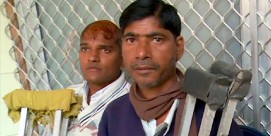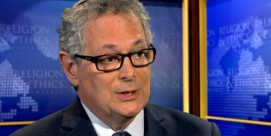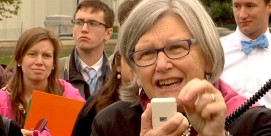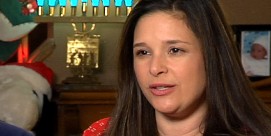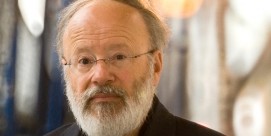In This Episode << SLIDE LEFT TO SEE ADDITIONAL SEGMENTS
Religion and Health Care Reform
BOB ABERNETHY, anchor: As President Obama pushed health care reform a coalition of religious leaders joined the effort with a rally and interfaith prayer service in Washington. The event brought together Hindus, Muslims, Christians, and others who called for universal and affordable health care. The group said health care is a moral issue and called the nation’s current situation too immoral to tolerate. One of the participants in that interfaith coalition is Sister Simone Campbell, executive director of NETWORK, a national Catholic social justice lobby. Her order is the Sisters of Social Service. She is also a lawyer. Sister, welcome.
Sister SIMONE CAMPBELL (Executive Director, NETWORK): Thank you.
ABERNETHY: In that coalition, your number one priority is expanding health care for everyone. Talk about that.
Sr. CAMPBELL: It’s a shocking outrage in our country. It’s a moral outrage that we have almost 50 million people without coverage, without access to a doctor, and we have even hundreds of thousands more that can’t even use the coverage that they have. That’s wrong. We have to change it.
ABERNETHY: Hard as that is, perhaps, to change, even harder is trying to figure out how to pay for what we’re doing.
Sr. CAMPBELL: Well, we have to be responsible and pay for it, but there’s lots of savings in the system. There’s administrative savings, streamlining processes, electronic filing. There are controls of costly expenditures, planning for where high capital equipment gets installed, and there’s ways of saving on expenditures for services, also.
ABERNETHY: Let’s talk about that — especially for older people. We read that there is just a whole lot of stuff that is prescribed and ordered that, at least in retrospect, looks as if it wasn’t really necessary and that the biggest savings are in what’s done for people in the last part of their lives.
Sr. CAMPBELL: Well, that is a significant area of savings. There’s a lot of evidence that the fear of dying keeps us holding on to life in such ways that extraordinary means get used on a regular basis, and that makes it really challenging for limiting costs. There are other places where cost savings can be obtained, too, but that’s a big one.
ABERNETHY: You have said that we need to “get real” about dying. Is that what you’re talking about — accepting it?
Sr. CAMPBELL: Yes.
ABERNETHY: Now how can you expect somebody to do that? You know, maybe another procedure will help.
Sr. CAMPBELL: And maybe it will, and that’s the hard part, but culturally as a nation we do not see death as integrated with living. We see it as something that’s to be feared. We’re getting better at it, but—with the hospice programs and other programs—but we as a culture need to accept dying is part of living, and it’s integrated. It’s one piece. And I as a person of faith know it’s not the worst thing that can happen to you.
ABERNETHY: It’s pretty hard to convince the family of somebody who’s very sick that you shouldn’t do everything possible to help them.
Sr. CAMPBELL: I think there’s a question between quality of life and what does it mean to do everything possible. When you see your loved one in pain — yes, it’s hard, but what are the choices? I think we have to be responsible in making those choices and that just because it can be done doesn’t mean it must be done.
ABERNETHY: And do you think it would be better off if doctors were on salary rather than fee for service?
Sr. CAMPBELL: There’s a lot of evidence that there are better health outcomes, that patients are happier when doctors get a salary and don’t have the incentive to prescribe additional treatment or to do just one more test. The real issue — health care is about nurturing the whole person, making the whole person well, and doctors need to take that into consideration, not just the money they make.
ABERNETHY: And, very quickly, are we going to get a bill this year? Are we going to get a law change this year?
Sr. CAMPBELL: I think we’ve got a great chance. It’s moving, but it’s going to be up to us, we the people, to insist that it happen. We’ve gone too long without it. We need to make it happen now.
ABERNETHY: Sister Simone Campbell, many thanks.
Sr. CAMPBELL: Thank you.



